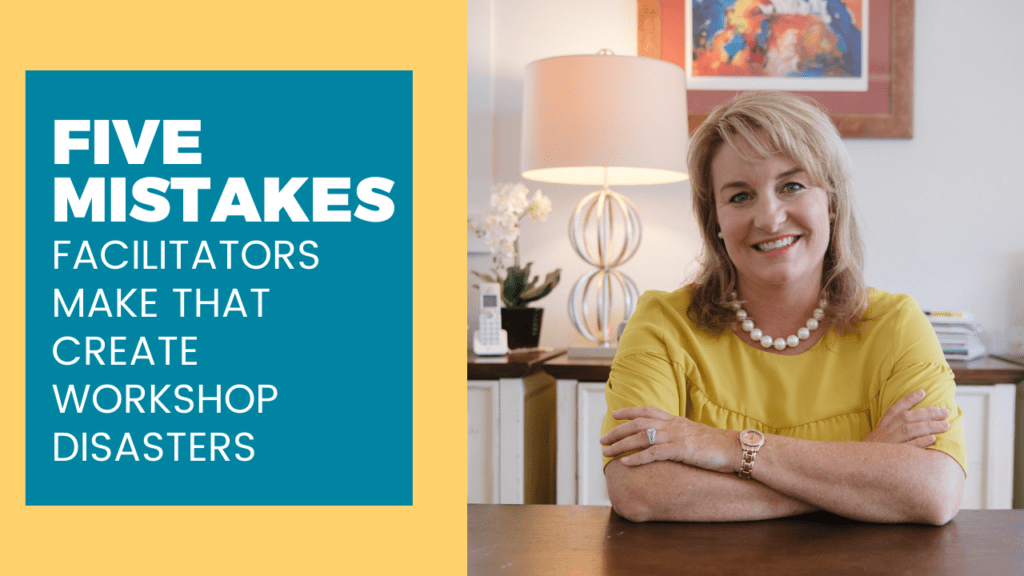Running successful workshops take time AND training. The good news is that Powers Resource Center can help your workshops start off on the RIGHT foot…follow these simple tips for avoiding the five mistakes facilitators often make that can create workshop disasters.
MISTAKE #1: Failure to Prepare
Managing and facilitating workshops requires much more than simply sending out the Zoom invite. Workshop facilitators serve as time managers, learning journey guides, and trust builders for participants. Avoid the frustration that inevitably occurs when planning and preparation hasn’t been adequate. By being proactive and planning ahead, you’ll create an ideal environment for learning to occur. Here’s how…
SOLUTION: Be Proactive
Workshops often fail not because of what happened IN the workshop, but because of what did not happen BEFORE the workshop. This is where leaders and facilitators really can make a difference…by focusing on their preparation.
- Visualize the beginning, middle and end of the workshop. What do you want them thinking, feeling and doing as a result of the workshop
- Map out the goals for the workshop, activities that help you accomplish the learning goals, common questions that come up, and the workshop agenda.
- Think through how you’ll facilitate each topic and engage the audience. How will you introduce and wrap up the workshop so everyone’s time feels well spent and their contributions value.
- Process how you’ll address issues that may come up like items that are taking longer to cover than you anticipated, a disruptor or dominator that needs redirection, and unexpected tech issues.
- Develop agreements for participation and plan to introduce them at the beginning of the workshop, asking for buy-in and agreement from the attendees.
MISTAKE #2: Failure to Stay Focused
Sometimes workshops can hit sour notes and veer off course. A trained and attuned facilitator knows that when this happens, the outcome can be feelings of wasted time and distrust. The moment this happens is a cue to the facilitator to take control for a course correction.
SOLUTION: Step in Early
When the discussion goes astray or one attendee dominates the discussion, the facilitator’s job is to intervene and guide attendees back to the agenda. Create a “parking lot” repository in the chat feature or on a separate page to capture ideas or comments that fall outside of the desired agenda with a promise to return to those items at a later workshop. This helps the facilitator maintain control of the workshop out of respect for all attendees and the agreed upon goals. Here, you can pause and reflect back to the group that you are guiding the discussion as promised and in accordance with the agreed-upon ground rules that were adopted at the beginning of the workshop.
MISTAKE #3: Not Dealing with Disruptors
Inevitably, there will be people who get excited, emotionally charged or dominant in a workshop setting. It’s 100 percent the facilitator’s job to not only anticipate this happening at every single workshop, but having practiced strategies in their back pockets for addressing disruptors. These range from a gentle reminder to the extreme of muting or removing someone from the call. Here are some tips for preparing for the worst…
SOLUTION: Connect with Your Audience
Disruptors are often people who feel passionately about a subject or who are personally affected by what’s being discussed. Facilitators will do well by not only anticipating these experiences, but also by recognizing our shared humanity in these situations. Noticing this potential in one or more of your workshop attendees and having some practiced techniques in place will keep the workshop on track and demonstrate to attendees that you are a skilled guide and leader.
As a baseline, staying tuned in to those who need the most attention, using their names warmly, acknowledging their contributions, commending their wisdom or vulnerability, and making notes about what they share. This will go a long way in ensuring this kind of participant is valued. This also demonstrates to the rest of the group that you not only have the meeting reins firmly in hand but that you care about all points of view, inviting those who might be LESS inclined to speak to safely share their thoughts and ideas as well.
MISTAKE #4: Failure to Debrief Your Meetings
Every workshop has room for improvement, and all workshop leaders have something to learn from every workshop. It’s easy to dive into the content and start moving forward on next steps to meet your goals. However, the last thing you want is a bad review when you neglected to ask for feedback in the first place.
SOLUTION: Provide Opportunities for Feedback
Be sure to include on your agenda five minutes for participants to provide their feedback on what went well and what didn’t go well. This will go a long way in building trust, facilitating connection, and improving the next workshop. This is particularly important if you plan to meet again with the same group. Using a simple Google Form or equivalent is an easy way to develop surveys and track themes. You can post this in the Zoom chat, email it after the workshop, or, depending upon group dynamics, ask attendees if they’d like to go through the questions together while you record their feedback.
MISTAKE #5: Failure to Take Formal Facilitation Training
Life moves at warp speed these days, making it difficult to not only get the work done, but to do the training and the learning it takes to make the work good. Failing to get trained as a facilitator can lead to unintended disasters, lower morale, disconnection and disruption, and overall distrust. We wouldn’t show up on stage to put on a concert without first learning how to play the guitar, would we? Workshop facilitation is no different.
SOLUTION: Invest in Training
Invest in formal workshop facilitation training. It not only will make you a better workshop leader, but undoubtedly will help you become a better listener, a more aligned team partner, and a more trustworthy guide. Good training not only covers the fundamentals of how to plan, lead and organize a workshop but also provides real-life scenarios and techniques for when things go wrong. And unavoidably, things do go wrong sometimes…even for the most seasoned facilitator. Plus, solid facilitation training will help you learn how to use and implement the input you receive at workshops in meaningful, effective and successful ways.
As workshop facilitation experts, PRC can train you to facilitate workshops like a superstar. Don’t miss the second installment of our Level UP Master Class program that teaches you “How to Be a Rockstar Facilitator,” incorporating proven tools, plans and strategies where your workshops will receive a standing ovation!
Related Posts
-
Five Powerful Leadership Lessons from…Geese
If you’ve ever seen a flock of geese flying overhead, you’ve probably noticed their unique “V” formation. It turns out, that the inherent nature of geese in flight has a lot to teach us about leadership, connection and teamwork. READ ON for five ways geese…





